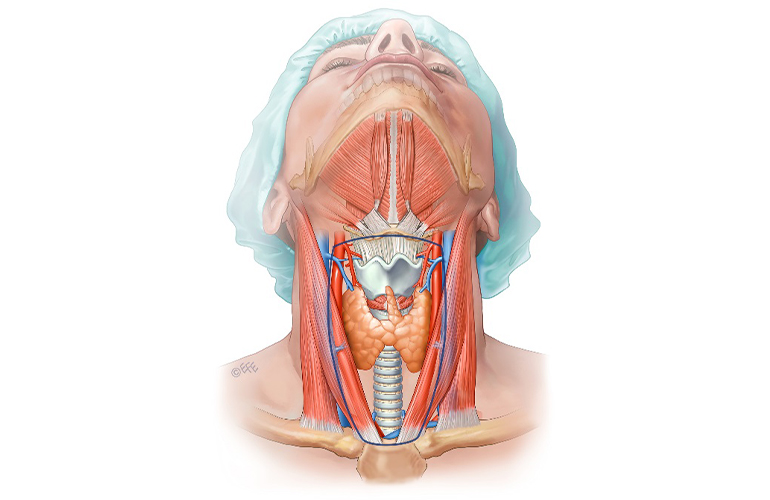
Thyroid
The thyroid gland is a butterfly-like endocrine gland located in front of the trachea in the neck, under the thyroid cartilage called the Adam's apple. Under normal conditions, it weighs 20-25 grams. It secretes the hormones it produces into the blood, so it has a rich blood and lymphatic vessel network. In the thyroid gland, mainly thyroid hormones (T3 and T4) and calcitonin hormone are produced.
Excess hormone secretion by the thyroid gland is called “Hyperthyroidism” and under-production is called “Hypothyroidism”. The condition of excess thyroid hormone in the blood is called thyrotoxicosis, popularly known as toxic goiter.
What is goiter?
Any non-tumor enlargement of the thyroid gland is called goiter. It could be due to many reasons. Having a goiter in an individual does not always mean that the gland is overworked. A similar situation may occur in underworked diapers. Treatment methods can be various drug treatments or surgical treatment depending on the underlying cause.
Hyperthyroidism
Excess hormone secretion by the thyroid gland can occur for a variety of reasons. The gland may be nodular or extensively modified. In case of hyperthyroidism, T3 and T4, which are thyroid hormones, are detected in the blood as high, while the level of TSH secreted from the pituitary gland, whose main task is to stimulate hormone secretion from the thyroid, is found to be low.
Symptoms of hyperthyroidism; weakness, palpitations, irritability, intolerance to heat, weakening despite increased appetite, sweating, diarrhea, shortness of breath, decrease in menstrual bleeding. In some special diseases, a bright look in the eyes and outward protrusion can be seen.
Causes of hyperthyroidism:
• Toxic multinodular goiter
• Toxic adenoma
• Basedow Graves' disease
• Certain periods of some thyroiditis
• Pregnancy hyperthyroidism
• Hyperthyroidism due to excessive intake of iodine or thyroid hormone
Hyperthyroidism treatment
The aim of the treatment is to eliminate the findings caused by thyroid hormones that directly affect the metabolic rate.
Generally, the initial treatment is the use of antithyroid drugs that act by stopping the synthesis of thyroid hormones. For this purpose, methimazole or especially propylthiouracil is used in pregnant women. If hyperthyroidism does not improve after 6 months-1 year of treatment, either radioactive iodine, which is popularly called atom therapy, or surgical treatment can be applied.
Causes of hypothyroidism
It is a common hormonal disorder, although its clinical findings are not always fully manifested. Its incidence increases especially in women and as age progresses. In case of hypothyroidism, T3 and T4, which are thyroid hormones, are found to be low in the blood, while TSH level is found to be high because the need for it increases.
The findings generally increase in parallel with the decrease in hormones. In subclinical pictures, only the hormone profile is impaired and it may not cause significant symptoms. Fatigue, weakness, weight gain, dry skin, hair loss, dry hair, joint pain, chills, constipation, menstrual irregularity, depression, infertility, blunted perception, coarsening of voice in advanced cases, hard edema under the skin may occur.
The most common cause of hypothyroidism in the society, especially among women; Hashimoto's thyroiditis, which can be defined as a kind of inflammatory disorder of the thyroid gland, is the removal of the thyroid gland by thyroid surgery and radioactive iodine treatment.
In the treatment, it can be applied to support with thyroid drugs.

